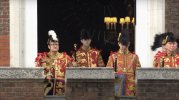Loxuru
Graf von Kreuzigung
Today 80 years ago, on August 7th 1942, US Marines invaded the island of Guadalcanal, part of the British Solomon Islands.
The Japanese were building a base on the island, including an airfield. If they would succeed, Australia would become isolated, since the base would control a large area of airspace and shipping routes east of it.
Guadalcanal was the first US amphibious action in the war (the previous on had taken place in 1998). The battel would last several months and end with Japanese retreat - the first land victory of the US in the Pacific.
In the mean time, there were also several navel battles, including the Battle of Savo island (one of the US Navy's greatest naval defeats) and the Battle of Santa Cruz, in which the US would loose their second aircraft carrier in the battle (USS Hornet), after the earlier loss of USS Wasp.
The Japanese were building a base on the island, including an airfield. If they would succeed, Australia would become isolated, since the base would control a large area of airspace and shipping routes east of it.
Guadalcanal was the first US amphibious action in the war (the previous on had taken place in 1998). The battel would last several months and end with Japanese retreat - the first land victory of the US in the Pacific.
In the mean time, there were also several navel battles, including the Battle of Savo island (one of the US Navy's greatest naval defeats) and the Battle of Santa Cruz, in which the US would loose their second aircraft carrier in the battle (USS Hornet), after the earlier loss of USS Wasp.






